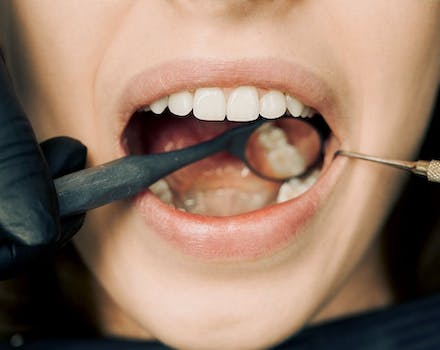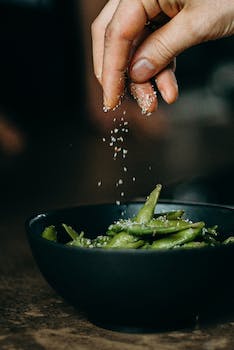

-
Table of Contents
Harnessing the power of the ocean for oral cancer treatment.
Introduction
Introduction:
Exploring marine bioactive compounds, nutraceuticals, and functional foods in oral cancer treatment has gained significant attention in recent years. Oral cancer is a prevalent and potentially life-threatening disease, and traditional treatment methods often come with various side effects. Therefore, researchers have turned their focus towards natural compounds derived from marine sources, as they possess unique bioactive properties that can potentially aid in the prevention and treatment of oral cancer. This article aims to provide an overview of the current research and advancements in utilizing marine bioactive compounds, nutraceuticals, and functional foods for oral cancer treatment.
The Potential Role of Marine Bioactive Compounds in Oral Cancer Treatment
Oral cancer is a serious and potentially life-threatening disease that affects millions of people worldwide. Traditional treatment options for oral cancer include surgery, radiation therapy, and chemotherapy. However, these treatments often come with significant side effects and may not always be effective in treating the disease. As a result, researchers are constantly exploring new and innovative approaches to oral cancer treatment, including the use of marine bioactive compounds.
Marine bioactive compounds are naturally occurring substances found in various marine organisms, such as algae, sponges, and corals. These compounds have been shown to possess a wide range of biological activities, including anti-inflammatory, antioxidant, and anticancer properties. As a result, they have attracted significant attention from the scientific community as potential therapeutic agents for various diseases, including oral cancer.
One of the most promising marine bioactive compounds in oral cancer treatment is fucoidan. Fucoidan is a sulfated polysaccharide found in brown seaweeds. It has been shown to exhibit potent anticancer effects against various types of cancer cells, including oral cancer cells. Studies have demonstrated that fucoidan can inhibit the growth and proliferation of oral cancer cells, induce apoptosis (programmed cell death), and suppress the invasion and metastasis of cancer cells. These findings suggest that fucoidan could be a valuable addition to the current treatment options for oral cancer.
Another marine bioactive compound that shows promise in oral cancer treatment is phlorotannin. Phlorotannins are polyphenolic compounds found in brown seaweeds. They have been shown to possess strong antioxidant and anticancer activities. Studies have demonstrated that phlorotannins can inhibit the growth and proliferation of oral cancer cells, induce cell cycle arrest, and promote apoptosis. Additionally, phlorotannins have been found to enhance the efficacy of chemotherapy drugs, making them potential adjuvants in oral cancer treatment.
In addition to fucoidan and phlorotannins, other marine bioactive compounds, such as marine peptides and marine sterols, have also shown promise in oral cancer treatment. Marine peptides are short chains of amino acids found in various marine organisms. They have been shown to possess anticancer properties and can inhibit the growth and proliferation of oral cancer cells. Marine sterols, on the other hand, are steroid-like compounds found in marine organisms. They have been found to exhibit potent anticancer effects against oral cancer cells by inducing apoptosis and inhibiting cell migration and invasion.
The potential of marine bioactive compounds in oral cancer treatment extends beyond their direct anticancer effects. These compounds have also been found to possess immunomodulatory properties, meaning they can modulate the immune system's response to cancer cells. This is particularly important in oral cancer treatment, as the immune system plays a crucial role in the development and progression of the disease. By enhancing the immune response against cancer cells, marine bioactive compounds could potentially improve the efficacy of existing treatment options and reduce the risk of recurrence.
In conclusion, marine bioactive compounds hold great promise in the treatment of oral cancer. Their diverse range of biological activities, including their direct anticancer effects and immunomodulatory properties, make them attractive candidates for further research and development. While more studies are needed to fully understand their mechanisms of action and potential side effects, marine bioactive compounds have the potential to revolutionize oral cancer treatment and improve patient outcomes.
Exploring Nutraceuticals as Adjunctive Therapy for Oral Cancer

Oral cancer is a serious and potentially life-threatening disease that affects millions of people worldwide. Traditional treatment options for oral cancer include surgery, radiation therapy, and chemotherapy. However, these treatments often come with significant side effects and may not always be effective in treating the disease. As a result, researchers and healthcare professionals are constantly exploring alternative and adjunctive therapies to improve patient outcomes.
One area of interest in oral cancer treatment is the use of nutraceuticals as adjunctive therapy. Nutraceuticals are bioactive compounds found in certain foods that have potential health benefits beyond their basic nutritional value. These compounds have been shown to possess anti-inflammatory, antioxidant, and anticancer properties, making them promising candidates for oral cancer treatment.
One such nutraceutical that has gained attention in recent years is curcumin, a compound found in turmeric. Curcumin has been shown to inhibit the growth of oral cancer cells and induce apoptosis, or programmed cell death. It also has anti-inflammatory properties that can help reduce the inflammation associated with oral cancer. Studies have shown that curcumin can enhance the effectiveness of chemotherapy drugs and reduce their toxic side effects. Additionally, curcumin has been found to inhibit the spread of oral cancer cells to other parts of the body, known as metastasis.
Another nutraceutical that shows promise in oral cancer treatment is resveratrol, a compound found in grapes and red wine. Resveratrol has been shown to inhibit the growth of oral cancer cells and induce apoptosis. It also has antioxidant properties that can help protect healthy cells from damage caused by free radicals. Studies have shown that resveratrol can enhance the effectiveness of radiation therapy and reduce its side effects. Additionally, resveratrol has been found to inhibit the formation of blood vessels that supply nutrients to oral cancer tumors, thereby preventing their growth.
Green tea extract is another nutraceutical that has been studied for its potential anticancer properties. Green tea contains a group of compounds called catechins, which have been shown to inhibit the growth of oral cancer cells and induce apoptosis. These compounds also have antioxidant properties that can help protect healthy cells from damage. Studies have shown that green tea extract can enhance the effectiveness of chemotherapy drugs and reduce their toxic side effects. Additionally, green tea extract has been found to inhibit the spread of oral cancer cells and prevent the formation of new blood vessels.
While nutraceuticals show promise as adjunctive therapy for oral cancer, it is important to note that they should not replace traditional treatment options. Nutraceuticals should be used in conjunction with surgery, radiation therapy, and chemotherapy to enhance their effectiveness and reduce side effects. It is also important to consult with a healthcare professional before incorporating nutraceuticals into an oral cancer treatment plan, as they may interact with other medications or have contraindications.
In conclusion, nutraceuticals have the potential to improve patient outcomes in oral cancer treatment. Compounds such as curcumin, resveratrol, and green tea extract have been shown to possess anti-inflammatory, antioxidant, and anticancer properties that can inhibit the growth of oral cancer cells and enhance the effectiveness of traditional treatment options. However, further research is needed to fully understand the mechanisms of action and optimal dosages of these nutraceuticals. With continued exploration and understanding, nutraceuticals may become an integral part of oral cancer treatment in the future.
Functional Foods: A Promising Approach for Oral Cancer Prevention and Treatment
Functional Foods: A Promising Approach for Oral Cancer Prevention and Treatment
Oral cancer is a serious and potentially life-threatening disease that affects millions of people worldwide. Traditional treatment options for oral cancer, such as surgery, radiation therapy, and chemotherapy, can be invasive and have significant side effects. As a result, researchers are constantly exploring alternative approaches to prevent and treat oral cancer. One promising avenue of research is the use of functional foods.
Functional foods are foods that provide health benefits beyond basic nutrition. They contain bioactive compounds, which are natural substances that have a positive effect on human health. These compounds can be found in a variety of foods, including fruits, vegetables, whole grains, and seafood. In recent years, there has been growing interest in the potential of functional foods to prevent and treat various diseases, including oral cancer.
Several studies have shown that certain bioactive compounds found in functional foods have anti-cancer properties. For example, curcumin, a compound found in turmeric, has been found to inhibit the growth of oral cancer cells and induce apoptosis, or programmed cell death. Similarly, resveratrol, a compound found in grapes and red wine, has been shown to suppress the growth of oral cancer cells and inhibit the formation of tumors.
In addition to their direct anti-cancer effects, functional foods can also help prevent oral cancer by reducing the risk factors associated with the disease. For example, a diet rich in fruits and vegetables, which are common sources of bioactive compounds, has been linked to a lower risk of oral cancer. Similarly, consuming omega-3 fatty acids, which are found in fatty fish like salmon, has been associated with a reduced risk of oral cancer.
Functional foods can also play a role in the treatment of oral cancer. For example, studies have shown that green tea, which contains a compound called epigallocatechin-3-gallate (EGCG), can enhance the effectiveness of chemotherapy drugs in killing oral cancer cells. Similarly, the bioactive compounds found in mushrooms have been found to enhance the immune response and improve the effectiveness of radiation therapy in treating oral cancer.
One of the advantages of using functional foods in the prevention and treatment of oral cancer is their safety profile. Unlike traditional cancer treatments, which can have significant side effects, functional foods are generally safe and well-tolerated. This makes them an attractive option for patients who are unable or unwilling to undergo more invasive treatments.
However, it is important to note that functional foods should not be used as a substitute for traditional cancer treatments. While they can play a valuable role in preventing and treating oral cancer, they should be used in conjunction with other therapies under the guidance of a healthcare professional.
In conclusion, functional foods offer a promising approach for the prevention and treatment of oral cancer. Their bioactive compounds have been shown to have anti-cancer effects and can help reduce the risk factors associated with the disease. Additionally, functional foods can enhance the effectiveness of traditional cancer treatments and have a favorable safety profile. As research in this field continues to advance, functional foods may become an integral part of oral cancer prevention and treatment strategies.
Q&A
1. What are marine bioactive compounds?
Marine bioactive compounds are natural substances derived from marine organisms, such as algae, sponges, and corals, that possess biological activities and potential health benefits.
2. What are nutraceuticals?
Nutraceuticals are food or food components that provide health benefits beyond basic nutrition. They are often derived from natural sources and can be used as dietary supplements or functional foods.
3. How are marine bioactive compounds and nutraceuticals being explored in oral cancer treatment?
Researchers are investigating the potential of marine bioactive compounds and nutraceuticals in oral cancer treatment due to their anti-cancer properties. These compounds have shown promising effects in inhibiting tumor growth, inducing cancer cell death, and reducing inflammation, making them potential candidates for developing new therapeutic approaches.
Conclusion
In conclusion, exploring marine bioactive compounds, nutraceuticals, and functional foods in oral cancer treatment holds great potential. These natural compounds have shown promising anti-cancer properties and can be used as adjunctive therapies to conventional treatments. Further research and clinical trials are needed to fully understand their mechanisms of action and determine their efficacy and safety. Nonetheless, incorporating marine bioactive compounds, nutraceuticals, and functional foods into oral cancer treatment strategies may provide new avenues for improving patient outcomes and quality of life.












